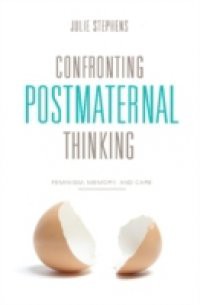Public discourse maintains a deep cultural anxiety around expressions of maternalism and the application of maternal values to the society as a whole. In a policy context, postmaternalism is the priority given to womens claims as employees over their political claims as mothers. Julie Stephens moves beyond these policy definitions and advances a notion of postmaternal thinking to signal this growing unease with maternal forms of subjectivity and maternalist perspectives. In defining the contours of postmaternal thought, she details the elaborate processes of cultural forgetting that go hand in hand with the ascendancy of postmaternalism.Postmaternal thinking relies on a questionable memorythat feminism failed motherhoodand casts second-wave feminists as being hostile to maternal expressions and ideals. Reclaiming an alternative feminist position through oral history, life narratives, web-blogs, and other rich sources, Stephens repudiates the core claims of postmaternal thought and confronts the misrepresentation of feminism as having forgotten motherhood. Deploying the interpretive framework of memory studies, she examines the political structures of forgetting that surround the maternal and the weakening of nurture and care in the public domain. She views the promotion of an illusory, self-sufficient individualism as profoundly connected to the ethos, politics, and economic practices of neoliberalism and lays the foundations for a wider social critique of such corrosive developments. In rejecting both traditional maternalism and the new postmaternalism, Stephens challenges dominant paradigms through new views of attachment and care and appeals for an alternative feminist maternalism centering on a politics of care.

